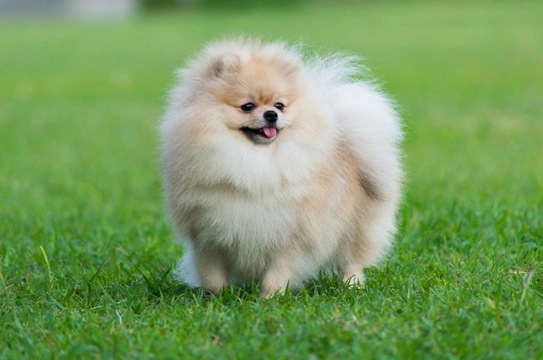
How popular is the Pomeranian dog breed?
The Pomeranian dog is a small breed that falls within the Kennel Club’s toy grouping, and they’re also one of the most popular breeds in the UK too – holding the 14th place position out of a total of over 240 different dog breeds and types.
Their small size helps to contribute to their appeal, because it means that they can live happily within even very small homes, making them a good fit for apartment and city living as well as of course being equally happy in large country houses.
Pomeranians are also quite expensive little dogs to buy, with registered pedigrees costing on average around £1,482, and non-pedigrees in the region of £813.
However, this relatively high purchase price has done nothing to prevent this little dog breed holding their own near the top of the popularity rankings – and in this article, we’ll examine what makes them such firm favourites, and why they are in such demand among people looking for a new pup to join their families. Read on to learn more.
They’re clever and easy to train
Pomeranians may be small but they’re also very smart, with the skills to learn and follow lots of different commands and the attention span to concentrate enough to pick them up in the first place!
We rate them four out of five for both their intelligence levels and trainability, because they’re really clever, but not likely to become bored so easily that they stop paying attention and look for something else to entertain themselves with when you’re working with them.
They form strong bonds with their families and often particularly with the person who provides most of their care and training, and will concentrate very hard when asked to and continually look to their handler for direction.
They don’t have the most onerous exercise requirements
Pomeranians tend to be lively little dogs that like to play, run around and go on interesting walks, but their small size means that you don’t need to walk them for hours and hours to tire them out. Providing that their walks are interesting and varied and provide opportunities for off the lead play, a couple of half-hour walks each day is usually sufficient to keep them fit and happy.
They have gorgeous coats that don’t shed too much
The Pomeranian coat is one of the breed’s most distinctive features, and their fur is very soft, dense and plush. Their coats have two distinctive layers, consisting of an outer layer of long and slightly harsh guard hairs, which covers their hugely fluffy dense undercoats, which are particularly thick around the shoulders, neck and chest.
Despite the sheer volume of fur that the Pomeranian has, they are not particularly heavy shedders, and so you won’t have to spend large portions of your day hoovering up after them! However, coats of this type do need quite a lot of attention, with regular brushing and grooming to keep it in good condition.
Thoroughly grooming the dog’s coat on a regular basis is really important, to avoid it becoming dirty, matted and knotted. Even though the Pomeranian is small, the sheer amount of fur that they have makes this a fairly drawn out process, and dogs of the breed also benefit from regular trips to the grooming parlour for baths and maintenance too.
They’re economical to keep
Like most small dog breeds, the cost of caring for a Pomeranian on a day to day basis is fairly low. All of their accessories will be small, including collars and leads, beds and bowls, and they also benefit from a lower comparative cost for things like flea and worming treatments compared to larger dogs too.
They are also quite economical to feed, requiring small portions of a good quality diet that is tailored to meet the demands of their age, activity levels and lifestyle.
They tend to be healthy and long-lived
Like many dog breeds from the smaller end of the size spectrum, Pomeranians tend to have fairly long lifespans, averaging between 12-16 years. They also tend to be fairly robust and prone to good health, despite their small sizes – however, like all pedigree dog breeds, there are a small number of hereditary health conditions found within the population that can affect individual dogs of the breed.
The Kennel Club and Pomeranian breed clubs strongly advise that potential parent stock be tested for the markers of both elbow dysplasia and chiari malformation/syringomyelia prior to being bred from, to curb the spread of these two conditions that have become somewhat common across the breed as a whole.
Pomeranians can also be prone to being born with a fontanel – a small open gap between the bones of the dog’s skull – which should close up over time as the dog matures.
However, this is not the case for all dogs of the breed, and this trait places the dog at greater risk of injury or damage from an impact to the skull. For showing purposes, adult Pomeranian dogs are inspected as part of the show’s judging to confirm that the fontanel has sufficiently closed before they are eligible to win a place.
Buying a Pomeranian puppy from a Kennel Club Assured Breeder, or another breeder who breeds for health and wellness and runs all of the appropriate tests on their parent stock before going ahead with a mating match can help to ensure that your new pup will be healthy – and help to improve the health of the breed as a whole.



